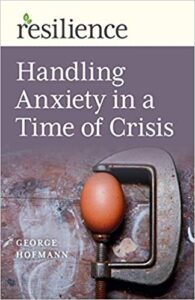Anxiety is a typical feature of modern life and COVID-19 provided an ideal ground for it to flourish. But how many of us know how to handle it before it leads us to bad decisions? A new book came at the right time to create a refreshing look at the reality of anxiety in modern times.
 Entitled ‘Handling Anxiety in a Time of Crisis’, the book provides exactly what it promises: It outlines simple tactics helping the reader to recognize the onset of anxiety and act to prevent the worst of it.
Entitled ‘Handling Anxiety in a Time of Crisis’, the book provides exactly what it promises: It outlines simple tactics helping the reader to recognize the onset of anxiety and act to prevent the worst of it.
Written by George Hofmann, who managed to overcome the worst of bipolar disorder himself and has successfully taught his techniques to countless others while promoting meditation for self-healing, the book seeks to address the uncertainty of recognizing symptoms of anxiety, enabling readers develop a better awareness for the issue in order to deal with it.
Drawing on his personal experience, the author provides lived and genuine insights and practices to help us identify anxiety and handle it before it is too late, whether in a time of crisis or just for simple meditation.
Acting as a valuable resource on the issue, the book enables us to explore and identify the fine line between the normal stress that each one of us encounters in everyday life and the anxiety that becomes debilitating. Moving deeper, it provides strategies to managing negative thoughts, while demonstrating how healthy habits, such as meditation, can help build resilience.
Meanwhile, what makes this book extremely relevant is its timing. In 2020, stress has increased exponentially due to the unprecedented situation of Covid-19, making discussion of mental health more critical than ever, and while access to professional help is severely constrained.
Although the book comes in a critical time when stress is the new normal, the insights provided are a must-read to anyone wrestling with anxiety in a holistic point of view, while reminding the most essential: Anxiety is normal, is universal, and nobody is alone in this.
See also: Mental wellbeing in times of stress: The COVID-19 case
Did you know? Increased anxiety is sometimes related to unexpected panic attacks, which may be expressed through the following symptoms:






























































